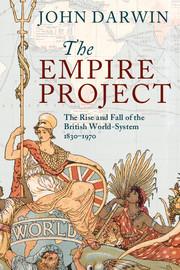Book contents
- Frontmatter
- Contents
- List of maps
- Preface and acknowledgments
- Introduction: the project of an Empire
- Part I Towards ‘The Sceptre of the World’: the elements of Empire in the long nineteenth century
- Part II ‘The great liner is sinking’: the British world-system in the age of war
- 8 The war for Empire, 1914–1919
- 9 Making imperial peace, 1919–1926
- 10 Holding the centre, 1927–1937
- 11 The strategic abyss, 1937–1942
- 12 The price of survival, 1943–1951
- 13 The third world power, 1951–1959
- 14 Reluctant retreat, 1959–1968
- Conclusion
- Notes
- Select bibliography
- Index
9 - Making imperial peace, 1919–1926
Published online by Cambridge University Press: 11 December 2009
- Frontmatter
- Contents
- List of maps
- Preface and acknowledgments
- Introduction: the project of an Empire
- Part I Towards ‘The Sceptre of the World’: the elements of Empire in the long nineteenth century
- Part II ‘The great liner is sinking’: the British world-system in the age of war
- 8 The war for Empire, 1914–1919
- 9 Making imperial peace, 1919–1926
- 10 Holding the centre, 1927–1937
- 11 The strategic abyss, 1937–1942
- 12 The price of survival, 1943–1951
- 13 The third world power, 1951–1959
- 14 Reluctant retreat, 1959–1968
- Conclusion
- Notes
- Select bibliography
- Index
Summary
In 1918, the British won an astonishing, almost fortuitous, victory, snatching an imperial triumph from what seemed, as late as June, the jaws of continental defeat. Their greatest imperial rivals had been broken, one (Russia) by the other (Germany). In the Armageddon of empires, British credit, domestic unity and imperial cohesion had been tested to the limit, but had survived. Of the three principal victor powers, the United States, France and Britain, the British seemed best placed to turn the making of peace to their advantage. They had made the largest territorial gains, in the Middle East, Africa and the Pacific and had most to bargain with. They had incurred heavy debts to the United States, but London's influence on post-war reconstruction was bound to be large, since it was from London that the European victor states had borrowed most. With their pre-war rivals in disarray, there seemed little danger that British authority would be challenged by colonial politicians – whose leverage had been cut down by peace – or client states, no longer able to play off two sides in the great game of imperial influence. Above all, perhaps, with the gravest threat to the balance of power in Europe extinguished by the defeat of the Central Powers, the British could hope to lower their naval guard (after the strain of the Anglo-German arms race) and ease the pre-war tensions over imperial defence created by their single-minded concentration on the North Sea.
- Type
- Chapter
- Information
- The Empire ProjectThe Rise and Fall of the British World-System, 1830–1970, pp. 359 - 417Publisher: Cambridge University PressPrint publication year: 2009
- 1
- Cited by



